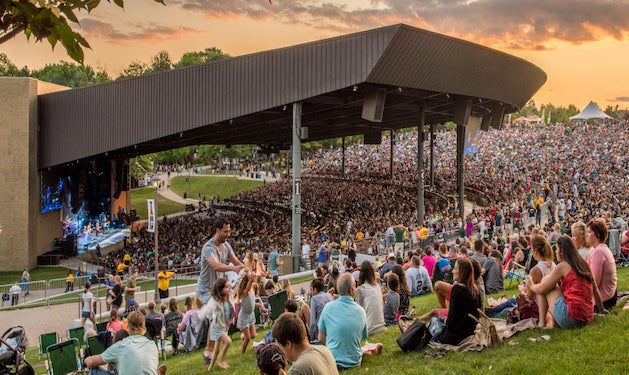Just after midnight on Sunday night/Monday morning, the Woodstock audience got a taste of high-energy blues-rock from one of the best in the business, Johnny Winter.
Day Three, Performer 5: Johnny Winter
Performed Monday morning, August 18, midnight–1:10 am
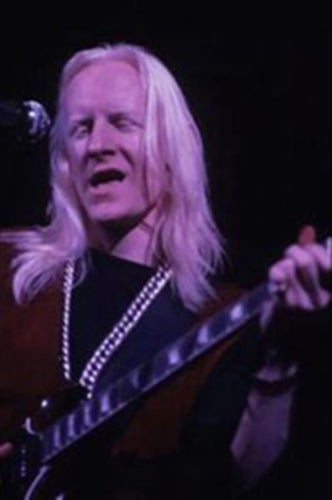
Johnny Winter performing on-stage at Woodstock.
Johnny Winter Band Members
- Johnny Winter: guitar, vocals
- Edgar Winter: keyboards
- Tommy Shannon: bass
- "Uncle" John Turner: drums
Johnny Winter Woodstock Setlist:
- Mama, Talk to Your Daughter
- Leland Mississippi Blues
- Mean Town Blues
- You Done Lost Your Good Thing Now/Mean Mistreater
- I Can't Stand It (featuring Edgar Winter)
- Tobacco Road (featuring Edgar Winter)
- Tell the Truth (featuring Edgar Winter)
- Johnny B. Goode (featuring Edgar Winter)
Born on February 23rd, 1944 in Beaumont, Texas, and raised in a musical family, Johnny Winter and his brother, Edgar, both of whom were born with albinism, began performing at a young age. Both brothers were multi-instrumentalists, with Johnny specializing in guitar and Edgar gravitating towards varous keyboard instruments. As a fifteen-year-old, Johnny went to see blues greats Muddy Waters, B.B. King, and Bobby Bland. His band, Johnny and the Jammers, recorded a single, “School Day Blues,” on a local label, and in 1967, Johnny cut his first solo single, a cover of Jimmy McCracklin’s “Tramp,” which displayed his brand of in-your-face blues guitar pyrotechnics. The following year, Johnny’s first album, The Progressive Blues Experiment, was released on a local Austin-area label (it would be reissued the following year by United Artists). This album featured what would become Johnny’s regular backing band, featuring Tommy Shannon on bass, Uncle John Turner on drums, and Edgar Winter on keyboards and saxophone.
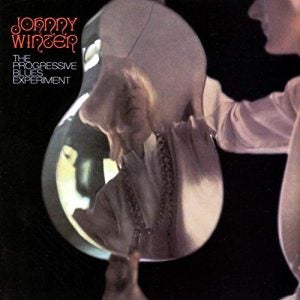
was released on a local label in 1967
Almost immediately, Johnny’s prodigious talent was recognized by both his peers and blues legends alike. B.B. King, the King of the blues, recalled playing a small club in Texas in the mid-1960s to an all-black audience. In walk four white guys, and one of them was “REALLY white.” One of the guys convinced B.B. to invite the albino guitar slinger onstage, and when he started playing, he blew both the discerning black audience and B.B. and his band away in short order. In December 1968, Mike Bloomfield invited Johnny Winter to play a song during a concert at the Fillmore East in New York City. Representatives of Columbia Records were in the audience, and they signed him to a contract with a record-breaking $600,000 advance. His self-titled second album was released in 1969 with the same backing musicians as his first album. The album was a critical and commercial success, and the band toured and performed at rock festivals around the country in 1969, including Woodstock.
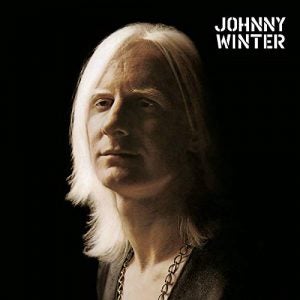
was released in 1968 and won him critical
acclaim and a legion of fans
Johnny Winter’s Woodstock performance was electrifying, combining what he had learned from the blues masters with the raw energy of rock. He performed extended instrumental jams punctuated by his high-pitched, mournful voice singing blues lyrics as though he had lived every word of them. Inevitably, given the late start to the Sunday festivities, the clock now ticked its way into Monday morning as Johnny Winter made his way onto the Woodstock stage. The Texan had recently released his self-titled second album and was carving out a name for himself as one of the hottest (if not THE hottest) guitarists around. Wasting no time, Johnny took to center-stage and opened with a powerhouse take on J.B. Lenoir’s blues classic “Mama, Talk To Your Daughter,” effortlessly peeling off some mind-bending licks. The stomping original “Leland Mississippi Blues” from Winter followed, and an early high point of the set came with a scorching version of “Mean Town Blues,” another Winter original from his first album The Progressive Blues Experiment. This featured a lengthy breakdown section in the middle of the song, with Johnny showcasing his inimitable slide guitar chops played on a 12-string Fender fitted with only six strings (for maximum string separation, thus making it easier to play slide).
The set settled into its midway point with a lengthy cover of B.B. King’s “You Done Lost Your Good Thing Now,” which drifted into James Gordon’s “Mean Mistreater,” the latter of which had also been included on Johnny Winter. At this point, Winter brought out an equally brilliant musician, his brother Edgar, to join him on keyboards and saxophone for the remainder of the set. The brothers began with a fun version of Bo Diddley’s “I Can’t Stand It” before Edgar virtually tore his voice apart with an impassioned rendering of John D. Loudermilk’s classic “Tobacco Road.” The main set ended with another up-tempo cover, a version of Ray Charles’ “Tell The Truth.” For the encore, Johnny pulled out a crazed version of Chuck Berry’s “Johnny B. Goode” which (as he informed the crowd) had recently been recorded by his band and would be released two months later on the Second Winter album.
Even though Johnny Winter’s performance was omitted from theWoodstockmovie and soundtrack, his career was long and successful. After the original band broke up in 1970, he formed a new band, Johnny Winter And, featuring ex-McCoys musicians Rick Derringer, Randy Jo Hobbs, and Randy Z, signaling a move toward a more conventional rock sound. He was sidetracked for a time while he battled heroin addiction, and after a stint in rehab he returned to music in the mid-1970s with several well-received studio and live albums. In addition to this, Johnny Winter also found success in producing. He produced three albums for his blues hero, Muddy Waters, earning Waters three Grammy Awards and a Grammy for his own work with Waters’ band backing him.
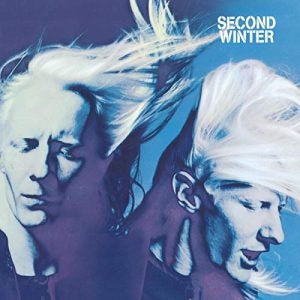
backing musicians was 1969's Second Winter
Of the musicians who backed Johnny Winter at Woodstock, bassist Tommy Shannon went on to play with Texan blues legend Stevie Ray Vaughn as a member of his backing group, Double Trouble, until Vaughn’s death in 1990. Since then, Shannon has continued to be in demand playing bass behind many legendary guitarists such as Eric Clapton and John Mayer. Drummer Uncle John Turner died in 2007 after a battle with Hepatitis C. Edgar Winter went on to great solo success, and occasionally collaborated with his brother. He returned to Bethel Woods Center for the Arts for a performance celebrating the 50th Anniversary of Woodstock in 2019. Johnny Winter continued to write, perform, and record until his death from emphysema and pneumonia in 2014, two days after playing a concert in Zurich, Switzerland.
—Wade Lawrence & Scott Parker
